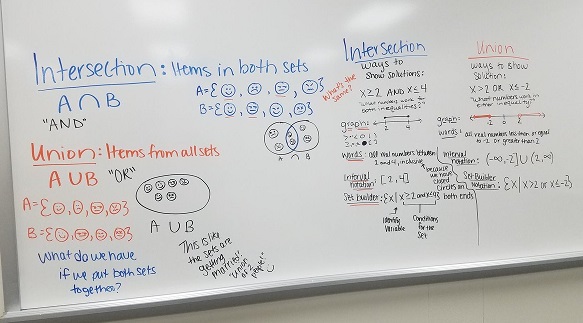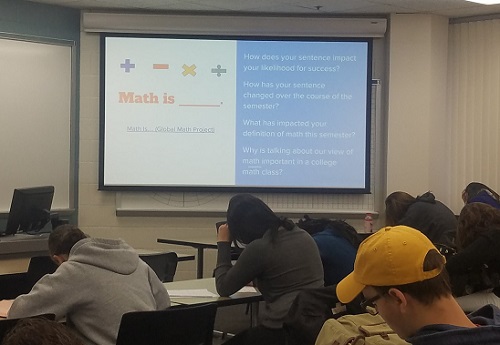- MN ABE Connect
- Archive
- Why I Started Focusing on Soft Skills in My Math Class, and Why You Should Too: PART 2
 November 19, 2018
November 19, 2018
Why I Started Focusing on Soft Skills in My Math Class, and Why You Should Too: PART 2
By Amber Delliger, Instructor / ATLAS Numeracy Advisory TeamIn Part 1 of this article, I addressed how we identified and started addressing gaps in soft skills among my students at Anoka Ramsey Community College.
In Part 2, I will share what we’ve learned and how you can apply this to your own setting.
What We’ve Learned So Far
1) Soft-skills mini-lessons are not enough
We set out by incorporating mini-lessons throughout the first three weeks of school on specific study skills (note taking, studying, test anxiety, navigating the math textbook) to set the stage for long-term success. Over multiple semesters we have seen that these mini-lessons just weren’t enough to improve student habits or behaviors. A major ah-ha moment for us was a reality check about making assumptions about any student’s skill set. We found that every time we assumed a student would have a skill, it would become clear that they hadn’t mastered it yet; or they had been relatively successful without it, but in the college setting their old strategies weren’t enough.
Each student comes in with varying levels of experience using soft skills in an academic setting. We are taking a page from the Universal Design handbook and decided that if a skill is worth reviewing for just a few students, it’s worth reviewing for all. This means that we recognize that we need to start from the basics and ensure that we never assume students know a study skill or how to navigate something in the college system.
2) Modeling skills in real-time is effective
I believe providing real-time modeling of the skills has the most dramatic impact on the likelihood a student will use a skill. One example of this comes from my time supporting the college faculty during lecture. I model how to ask questions or how to take a risk by asking questions. I feel like when students see me asking questions, the fear of talking in class isn’t as great.
Another example is when I model taking notes during a lecture and we break down what I recorded, why I recorded it, what I might want to add, or things that maybe weren’t as helpful. I have started spending more time discussing how to take the notes students would want to study from and reviewing notebooks to provided targeted feedback to students to improve their personal notes. After doing “notebook checks” and adding small pieces of feedback, I have notice the quality of notes has improved, along with quiz and test scores.

Example of modeled notes
3) Community-building positively impacts skill-building
In addition to incorporating more modeling and individualized feedback on study skills, we also worked diligently to learn all student names and personally greet and address each student. Our hope is that we are able to show that they are a valued member of our classroom community. We have found that his also helps when working to develop and maintain growth mindset norms and expectations for the classroom to foster a risk-taking environment.

Example of growth mindset activity
Another way we support risk-taking is to schedule time in the week to break down the formality of math class. We will spend a short break doing a community-building activity, discuss math via internet memes, watch a cheesy math music video on our current topic, or play a math-related game. In doing this we feel like we are welcoming students where they are at as learners and as people.
4) Soft-skill activities link math to real life
We also feel these soft-skill related activities can help peak the curiosity students may have about themselves and how they use math in their lives. By identifying and naming skills that we use inside and outside the math classroom, students are starting to see math inside and outside the math classroom! We lovingly call this recreational math in our classes, but students are now learning strategies to further their own learning, or see ways that math impacts their lives that they hadn’t seen before. By validating this curiosity, we find students are more likely to engage in productive struggle, be more flexible in their problem solving strategies, and use external resources more effectively. They are becoming more independent and self-driven learners!
Important Takeaways
- Do not assume your students will intuitively know how to function in a traditional US math classroom- even if they are recently out of a traditional school setting. Each school has its own norms and expectations, if you want the students to do something, protect the time it will take to teach them it!
- Providing students time and resources to become more independent learners shows that you respect them as learners. It is never our only hope that students do well in our classrooms, we want them to be successful learners far beyond our walls.
- Model, model, model. Just discussing soft skills with students isn’t enough for them to develop, practice and master the skill. Showing them how it can work in real time provides a deeper connection for the skill and is worth the instructional time to do so.
- Provide targeted feedback. Students often communicate to me that they are doing the best they can but don’t really know if something is really effective. Giving specific and timely feedback on notes, participation, observed study habits, etc, enables students to grow more quickly than only large group lessons.
I want to encourage you to join me in providing more targeted instruction, modeling, and support around soft skills in the math classroom. These skills will open the door for students to see the interconnectedness of math, soft skills, and the world around them. By looking at these students more holistically, you will provide a foundation for your students to be successful in math class and beyond!

Newsletter Signup
Get MN ABE Connect—the official source for ABE events, activities, and resources!
Sign UpArticle Categories
- ABE Foundations/Staff Onboarding
- ACES/Transitions
- Adult Career Pathways
- Assessment
- CCR Standards
- Citizenship
- COVID-19
- Cultural Competency
- Digital Literacy/Northstar
- Disabilities
- Distance Learning/Education
- ELA
- Equity/Inclusion
- ESL
- HSE/Adult Diploma
- Listening
- Math/Numeracy
- Mental Health
- Minnesota ABE
- One-Room Schoolhouse/Multilevel
- Professional Development
- Program Management
- Reading
- Remote Instruction
- Science
- Social Studies
- Speaking/Conversation
- Support Services
- Teaching Strategies
- Technology
- Uncategorized
- Volunteers/Tutors
- Writing